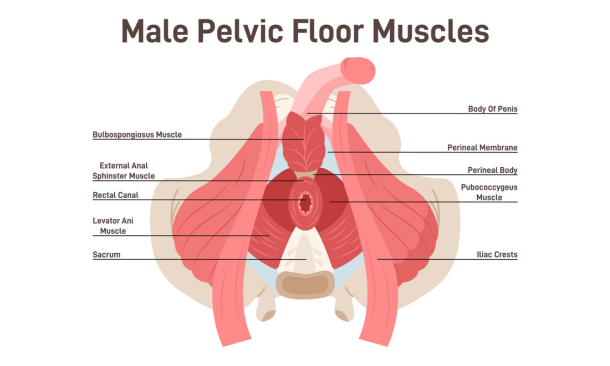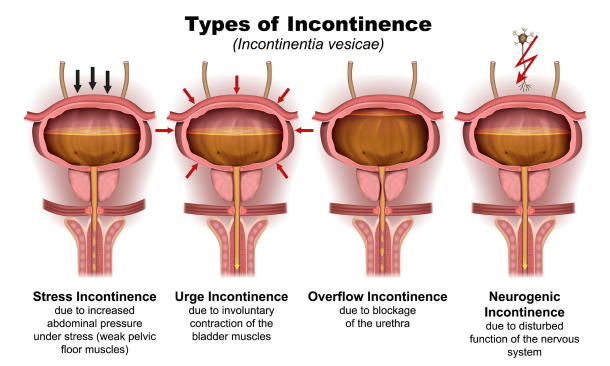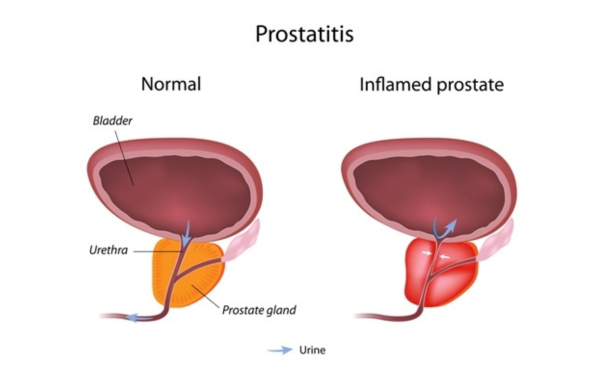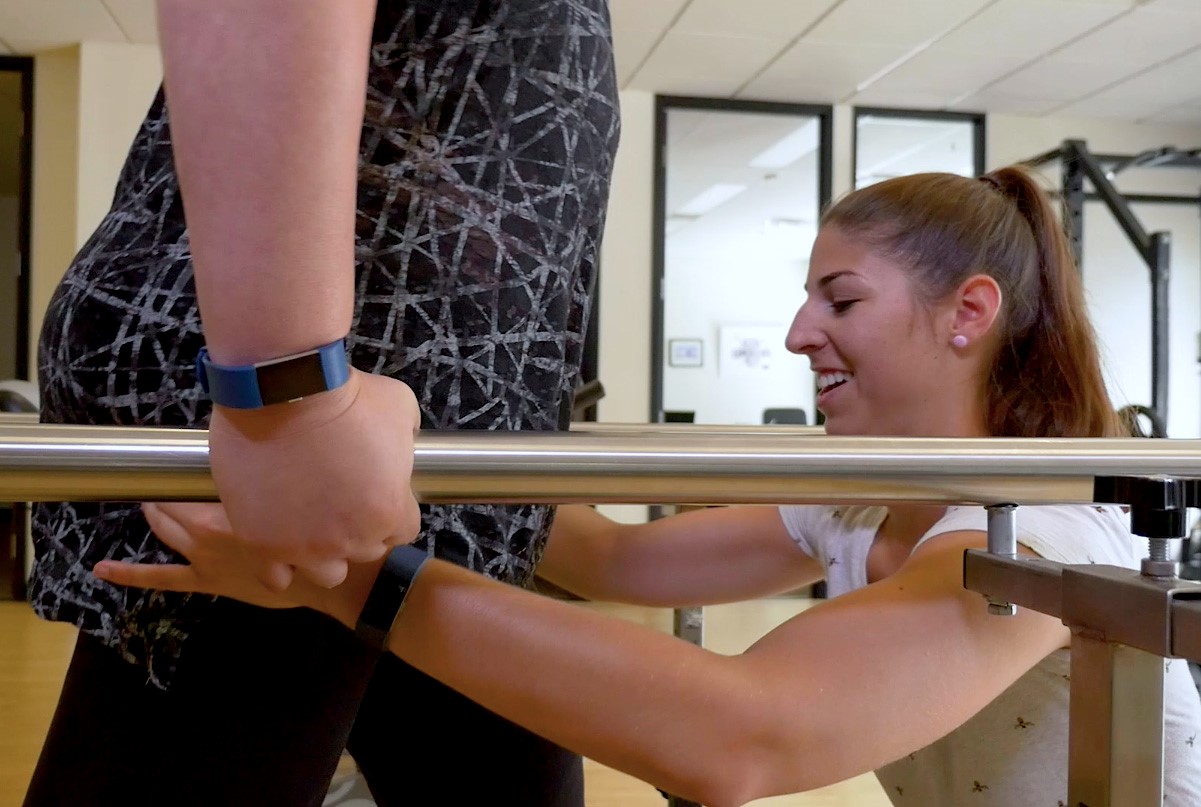While we often assume only women require pelvic floor physiotherapy, it is important to remember that men have pelvic floors too. Therefore, men can also benefit from male pelvic floor therapy.
Pelvic floor dysfunction in men can show up as changes in bowel and bladder function, sexual health, or even pelvic pain. Many of these are related to underlying muscle dysfunction and can be treated by a pelvic floor physiotherapist.
In this article, we will discuss what roles the pelvic floor anatomy plays, common pelvic floor conditions in men, the causes of pelvic floor dysfunction and the role of male pelvic floor therapy.
Table of Contents:
- What is pelvic floor therapy?
- Male pelvic floor muscle functions
- Common pelvic floor conditions in men
- Causes of pelvic floor dysfunction in men
- Male pelvic floor therapy: what to expect
What is pelvic floor therapy?
Pelvic floor physiotherapy is a branch of physiotherapy that deals with assessment and treatment of various conditions of the pelvic floor. Pelvic floor therapy helps optimize pelvic floor function to improve control, increase blood flow to the area, as well as reduce pain and discomfort.[i]
You may also enjoy reading: Incontinence Treatment Without Surgery
Male Pelvic Floor Muscle Functions
The pelvic floor is like a trampoline. It spans from the pubic bone in the front to the tailbone in the back and from one side of the hip to the other.
There are five functions of the male pelvic floor:
- Support: It holds organs such as your bladder and rectum.
- Sphincteric: the muscles help control the opening of the urethra (to help urine come out) and rectum (where feces/gas comes out), similarly the muscles prevent the leakage of urine, feces and gas
- Sexual Function: it has a role in orgasm and ejaculation.
- Stability: helps with fixing the trunk while moving the arms and legs and
- “Sump pump”: it is part of the circulatory system and helps to get lymphatic fluid from the leg back to the heart).[i]
You may also enjoy reading: Pelvic Floor Muscles 5 Important Roles
Common Male Pelvic Floor Conditions
Many factors contribute to pelvic floor dysfunction. Pelvic floor dysfunction is caused by the pelvic floor muscles being too weak (being unable to contract), or too tight (being unable to relax the muscles or having little stretch to the muscle), or both. This can happen with age, an injury, disease or surgery which impacts the health of the pelvic floor muscles. It is important to recognize some symptoms of pelvic floor dysfunction to ensure you get the help you need to improve your health.
Incontinence: A weak pelvic floor can lead to stress incontinence, an involuntary loss of urine or stool during or after an activity. Symptoms can include leakage during sports or when coughing, sneezing or laughing.
Urgency and frequency: This involves having a frequent need to urinate or being unable to fully empty when going to the bathroom. Often individuals complain about going to the bathroom every hour or having to wake up at night several times to use the bathroom. Often this can be a result from tight pelvic floor muscles.
Prostatitis: Also known as Chronic Pelvic Pain Syndrome, is inflammation of the prostate gland that results in pelvic pain and urinary problems.
Prostatectomy: A prostatectomy is a surgery to remove a part of or the whole prostate, often in those who have prostate cancer. Pelvic physiotherapy can help with urinary incontinence that is often experienced after the surgery.
Constipation: This includes irregular, infrequent or difficulties eliminating stool that is not related to a medical disorder. Individuals may be unable to contract and relax their pelvic floor muscles correctly resulting in constipation. This can sometimes be a result of having a tight pelvic floor.
Lower back pain: One of the functions of the pelvic floor is to help provide stability. Evidence shows that individuals with lower back pain has a reduction in pelvic floor function. The pelvic floor muscles work together along with the abdominal muscles and back muscles to influence posture and help stabilize the trunk.
You may also enjoy reading: Urinary Incontinence Treatment
Causes of Pelvic Floor Dysfunction in Men
There are several factors that can result in pelvic floor dysfunction in men.
Age: as we age, muscles naturally weaken, including muscles of the pelvic floor. This can lead to pelvic floor issues such as incontinence.
Obesity: excess weight can put additional pressure on the pelvic floor which can result in weakness
Chronic coughing: this results in excess strain on the area and can cause the muscles to get weaker.
Prostate surgery: following a prostate surgery, some men experience weakened pelvic floor muscles.
Constipation/straining: this leads to stress on the pelvic floor muscles and result in them weakening.
Posture: dependent on one’s posture, the muscles of the pelvic floor may be tighter, resulting in pain.
You may also enjoy reading: Lower Back Pain Treatment
Male Pelvic Floor Therapy: What to Expect
Pelvic health is a branch of physiotherapy that specializes in the internal and external assessment and treatment of pelvic floor muscles. Your physiotherapist can teach you how to relax, strengthen and stretch the pelvic floor muscles to improve their function.
An assessment starts by obtaining a detailed history to help explain the symptoms a patient is experiencing. Then the physiotherapist will complete an external assessment looking at the abdominal, back, and hip muscles, posture, breathing patterns and functional movements.
Sometimes, an internal assessment of the pelvic floor muscles is completed to assess the tension, strength, and function (the ability of the muscles to contract and relax) of these muscles.
Your physiotherapist will develop an individualized treatment plan, based on your goals. Your treatment plan could include:
- Education about the condition and how long to expect for recovery
- Exercises to strengthen pelvic floor muscles (or supporting external muscles) and/or to relax muscles that are tense.
- Breathing exercises for pain management and relaxing the tension of the pelvic floor muscles
- Acupuncture to help with pain management
- Behavioral changes: sometimes urgency can be related to diet and other habits, your physiotherapist will work will you to determine if there is any lifestyle changes you can make in order to help your progress.
- Pre-surgery exercises for those who may be getting a prostatectomy, building up the strength of the pelvic floor muscles is helpful to prevent urinary incontinence following surgery.
Pelvic floor conditions often tend to get worse overtime leading to further pain and disability. Seeking early intervention when you have a pelvic health condition is important in recovery. Our therapists have the knowledge and expertise to help develop a therapeutic approach for your needs and goals. At Propel Physiotherapy our pelvic health physiotherapists are available for a free consultation if you have any questions on how male pelvic therapy can be helpful for you.
Written by




















